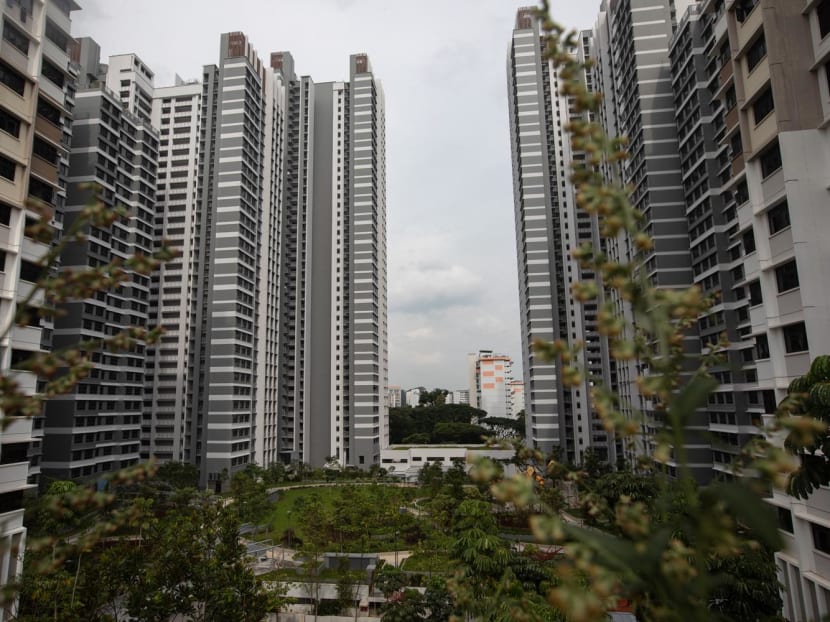Homeowners worried by soaring interest rates but analysts say strong job market, strict lending rules will reduce impact
SINGAPORE – When banks announced that home loan interest rates were going up, Mdm Siti (not her real name) was worried about whether the rates would continue to rise and significantly affect her family’s monthly expenses.

- Bank home loan rates have soared to the highest levels in almost two decades, forcing homeowners to relook their finances
- Several homeowners who spoke to TODAY said that they were worried about the rising rates and inability to repay loans if the rates continue to climb
- Some financial advisors have seen an increase in queries from homeowners asking for help to refinance their loans
- However, analysts say that as long as the job market remains stable as it is currently, homeowners do not have to worry about not being able to afford monthly repayments
- MAS’ Financial Stability Review shows that home loans repayment rate has strengthened and overdue loans have declined to a decade-low level of 0.3 per cent
SINGAPORE – When banks announced that home loan interest rates were going up, Mdm Siti (not her real name) was worried about whether the rates would continue to rise and significantly affect her family’s monthly expenses.
The 32-year-old real estate salesperson had initially taken a loan with the Housing and Development Board (HDB) for her four-room resale flat, before refinancing with a bank loan of S$260,000 with a tenure of 25 years and a floating rate of 1.3 per cent with a three-month compounded Singapore Overnight Rate Average (Sora).
Sora is the interest rate benchmark that banks use to determine the floating rate loans that they charge to borrowers.
Mdm Siti’s husband, who is a teacher, is currently paying S$1,081.75 per month, at an interest rate of 1.8688 per cent. Their combined monthly income is about S$11,000.
While he is still able to make monthly repayments as he has enough funds in his Central Provident Fund (CPF) Ordinary Account, the couple is worried about the rising interest rates.
“I think we'll be able to ride the wave for some time still, but we'll keep monitoring the interest rates. Even if we were to refinance, we have to consider if the refinancing fees of about S$1,500 to S$2,000 are worth the monthly savings,” Mdm Siti said.
HOMEOWNERS FACING MORTGAGE STRESS, FINANCES
Homeowners who spoke to TODAY have started to feel the pressure of rising home loan interest rates, since banks in Singapore raised their fixed home loan rates up to 4.5 per cent, the highest in almost two decades.
Yet, analysts say they are not concerned about the possibility of foreclosures – whereby lenders recover the amount owed on a defaulted loan by taking ownership of and selling the mortgaged property – rising in the near future.
This is because the job market here remains strong and the unemployment rate remains low, which means that homeowners can still find jobs and earn enough to pay for their housing loans.
In addition, strict borrowing rules in Singapore ensure that homeowners cannot overextend themselves so easily.
OCBC’s Financial Wellness Index 2022 released on Tuesday (Nov 22) shows that 40 per cent of working adults in Singapore surveyed said that they were experiencing some form of mortgage stress. The study polled 2,182 people between the ages of 21 and 65.
Mortgage stress, according to the bank, refers to difficulty in making repayments.
This difficulty has varying levels: From being able to make repayments but with some difficulty, to being forced to sell off their property or downgrade to a smaller house.
Of the 40 per cent experiencing mortgage stress, seven in 10 have HDB loans.
The report also shows that out of the 40 per cent, one in four have monthly personal incomes of less than S$4,000.
Another homeowner Mdm Noor (not her real name), 57, said she regretted switching from an HDB loan to a bank home loan.
Mdm Noor, who is a homemaker, said: “I bought the house about 20 years ago with an HDB loan. But I changed to a bank loan 10 years later because my relative told me it was better, especially with its lower interest rate back then.
“But I’m getting quite worried about our repayment because the interest rates keep rising. My husband is already working long hours, and I don't want him to work longer hours to be able to afford repayment.”
Her husband, who works as a cook, is solely repaying the loan for their five-room HDB flat with his CPF Ordinary Account.
“The last time my daughter checked with the bank, she said our monthly repayment rate will stay the same but I’m still worried so I will see how the situation goes,” added Mdm Noor.
However, she added, her children who are in their mid-20s and already working would have to step in if the monthly repayments start to increase.
Some financial advisors have seen an increase in the number of clients asking for help to refinance their loans.
Refinancing, or extending the tenure of home loans, spreads the repayment rate over a longer period of time, thereby reducing the monthly repayment amount.
In the last couple of months, Mr Clive Chng, associate director of Redbrick Mortgage Advisory, said that his company has seen a 50 per cent increase in refinancing enquiries and a 40 per cent decline in loan enquiries for purchases.
According to Mr Bryan Chan, client adviser at Providend, refinancing is an option that homeowners with bank loans can consider.
“Higher rates can cause cash flow strain, so homeowners should be more prudent in their spending and ensure they have enough emergency savings,” said Mr Chan.
“Refinancing is an option depending on the outstanding amount, the remaining loan tenure and mortgage terms.
“Another option is to pay down the loan or principal lump sum so that interest goes down, but this may not be an option for everybody.”
Although some homeowners may feel worried, MAS’ Financial Stability Review 2022 that was released on Friday shows that the credit quality of housing loans has strengthened further over the past year even as mortgage relief schemes expired in September 2021.
The report also shows that housing non-performing loans, or loans that are more than 90 days past due, declined to a decade-low level of 0.3 per cent.
In addition, the number of foreclosures has also trended down since 2021 and has remained low at fewer than 30 units so far this year.
IMPACT ON HOMEOWNERS IN THE LONG RUN
While interest rates have risen, this will not have a significant effect on homeowners in the short term, said Mr Chris Koh, director of real estate agency Chris International.
However, households will be severely affected if interest rates continue to rise even higher, which is a possibility.
“The housing market in Singapore saw a 6 to 7 per cent interest rate in the 1990s, so a high interest rate has happened before due to the Asian financial crisis,” said Mr Koh.
“If interest rates go very much higher, say to the point that an instalment goes up by about S$1,000, I think people might want to consider disposing of their property and downgrading to a smaller home.”
Ms Selena Ling, chief economist for OCBC bank, said that as long as the job market stays healthy and the unemployment rate is low, households should be able to service mortgage loans even as interest rates rise.
Another economist, Mr Song Seng Wun from CIMB Private Banking, agreed, saying that government regulations and policies on borrowing ensure that people do not take loans that exceed their means.
“The ability to repay loans will depend mostly on people themselves. All the Government can do is to regulate, but you must make sure that you spend within your means,” said Mr Song.
“The bank also has to be very responsible in ensuring that when they're lending money out, that the person or entity they're lending to can afford it.”











